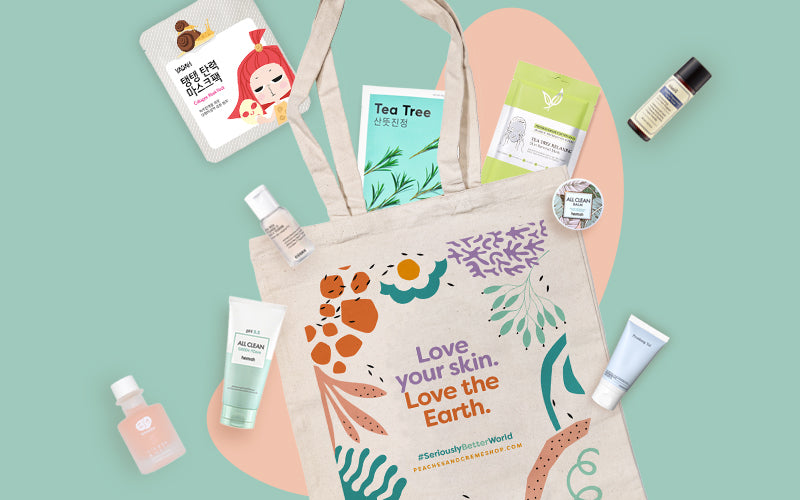Skincare 101: Chemical vs. Physical Exfoliators
Our skin naturally exfoliates dead cells every day. But over time, this shedding process slows and may even stop altogether. This results in dull, dry, or flaky skin; clogged, enlarged pores; bumps, wrinkles, loss of firmness, and uneven skin tone.
Why exfoliate?
Exfoliation can benefit people of all skin types. Through exfoliation, we help restore and optimise the natural process of shedding dead skin cells. When dead skin cells are gently removed, it can rejuvenate dull skin and give it a healthy glow. It can also prevent and reduce acne breakouts in oily and/or acne-prone skin and stop pores from becoming clogged.
For drier skin types, it can visibly lessen the depth of wrinkles, and encourage better absorption of the hydrating benefits of humectants and moisturizers for effective rehydration.
No skincare regimen is complete without weekly exfoliating, even for those with sensitive skin.
How do I start?
You don’t have to exfoliate daily, but keep in mind that exfoliating at least twice a week is key to clear, silky, smooth skin. Sloughing off dead skin cells gives way for the rest of your skin care products to penetrate deep down and absorb into your pores and do their magic.
But there are some things to keep in mind because too much of a good thing can be bad for your skin. Over-exfoliating may lead to dryness, damage, and even hypersensitivity and irritation. You have to consider 1) your skin type and 2) whether using a chemical or physical exfoliator (or both) is right for your skin.
Physical vs Chemical Exfoliators
Let's get up close and personal with each type to see which one is best for your skin needs and goals.

Physical (or Manual) Exfoliators include all products or tools that use friction to physically exfoliate the skin surface, like scrubs (cleansers with tiny grains and bits), as well as brushes and sponges used while cleansing. What's good about physical exfoliators is that instant gratification that you get after using them on your face, when you immediately feel the change in your freshly-scrubbed, smooth, rosy cheeks.
But since we're relying on a physical action here, remember to be gentle. Don’t go too hard and just gently massage your face. (They may be called scrubs, but please don't actually scrub your face like you would your kitchen counter.) The small granules are enough to do the work, we promise. Scrubbing too roughly or too much can irritate your skin and expose raw skin tissue to bacteria and infection.
What to look for in a physical exfoliator
- When you use a scrub, make sure that it is not overly abrasive (like larger particles such as fruit pits with jagged edges that might cause micro-tears on the skin surface). You want to look for round particulates, granules that dissolve (like sugar), or finely ground particles (like jojoba beads).
- When you're choosing an exfoliating tool, make sure they're nice and soft, and non-abrasive. For instance, konjac sponges are gentle enough to use daily with your water-based cleanser. When using any wet tool, remember to clean it thoroughly and dry it after using, and replace it regularly to keep bacteria away.
Click here to see all our physical exfoliators.
Chemical exfoliants are basically acids that help speed up the skin's natural shedding process, and help fade skin imperfections like pigmentation, scars, even wrinkles. It's a great option for people with sensitive skin.
Hold up - acids?
Don't fret! While there was indeed an era of strong astringents and peeling chemicals, Korean skincare is far ahead and away from that harsh "treatment" paradigm—and instead, we have a more gentle, natural, and nourishing skincare principle.
And while you might wonder: Are acids safe? Will it hurt my skin? Chemical k-beauty exfoliants utilise gentle acids in low percentages. With regular use, they help speed up our skin’s natural process of shedding dead skin cells, revealing fresh, healthy, brighter, smoother skin. It can also help reduce the appearance of acne, pores, fine lines, and hyperpigmentation. Plus, a healthier skin surface also makes it better at fighting acne!
Chemical exfoliants come in the form cleansers, toners, serums and sometimes even moisturizers.
What are the types of chemical exfoliants?
Common chemical exfoliators will have either AHAs or BHAs. Both work to 'unglue' the bonds holding dull, dead skin on the surface. Once these bonds are broken, the skin sheds them off naturally. You will soon feel your skin becoming smoother, brighter, and more youthful (even without actually seeing the shedding off process!).
AHAs (Alpha Hydroxy Acids) are water-soluble, which means they only work on the surface of the skin. They are generally recommended for normal to dry and even sun-damaged skin because of their hydrating properties. Use AHAs if you want to reduce signs of sun damage, aging, and uneven skin.
BHAs (Beta Hydroxy Acids, commonly known as salicylic acid) are oil-soluble, meaning they can penetrate deep inside the pores while also working on the surface. Because they are oil-soluble, they can dissolve the nasties and gunk that accumulate and clog the pores, in addition to their natural skin-calming and anti-inflammatory properties. Good for all skin types, especially sensitive and acne-prone skin.
Recently, you may have also seen a new addition to these two: PHAs. PHAs (Polyhydroxy acids) are second-generation AHAs. In comparison, they have a larger molecular structure which limits their ability to penetrate the skin. In turn, they work exclusively on the surface without disturbing the deeper delicate layers of the skin, minimizing potential sensitising side effects which makes the skin susceptible to UV rays. Ideal for sensitive skin and those intolerant to AHAs and BHAs.
Read our complete guide to skincare acids and learn in detail how they can benefit your skin type, and help you address your skincare concerns.
Click here to see all our available chemical exfoliators.
How do I choose the exfoliator that’s right for me?
Most skin types can use a combination of physical and chemical exfoliants in their skincare routine. You can even combine different types of acid in one routine! When choosing what type of exfoliant to use, always keep in mind your skin type. How often you should exfoliate depends on your skin type and skin concerns.
If you have sensitive skin or you have rosacea, physical scrubs might be too strong for your skin.
If you have oily or acne-prone skin, you can use both as long as you do not have active acne, then you can definitely use a physical scrub more often than sensitive skin.
If you have combination or normal skin, you can use physical scrubs at least once or twice a month, to as often as 2-3x a week. Physical exfoliation can give your skin that healthy boost and nice smooth texture. Combination and normal skin types can also use chemical exfoliants regularly as well, and complement it with periodical physical exfoliation to whisk away all those dead skin cells and improve dark spots, if you have any.
There’s really not a downside if you choose well-formulated, gentle exfoliants. There is not one single best way to use them – only a best way for you to discover for yourself. Every skin is unique, and you just have to try and see how your skin reacts and adjust usage and frequency as you need.










Leave a comment